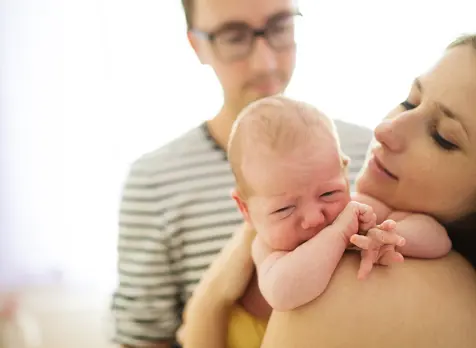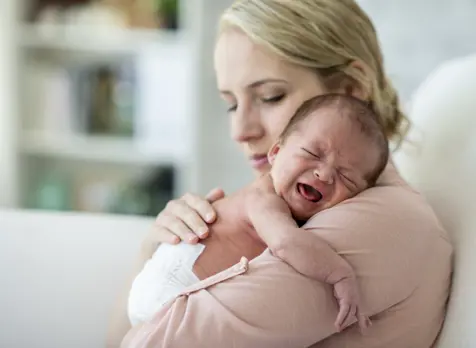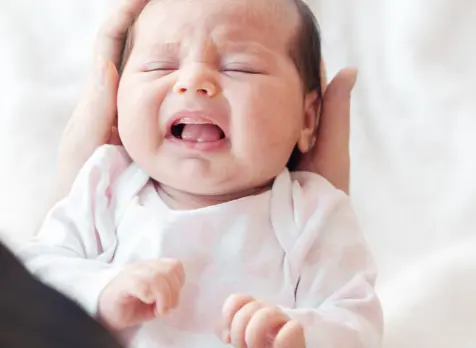Why Won't My 2 Month Old Baby Stop Crying

Your baby has both physical and emotional reasons to fuss and cry for your help. Physical needs are easy to understand; they pretty much make everyone feel some sort of emotional upset.
Why your baby cries for help
Why do babies cry? Here are some reasons why he cries for help:
- Pain
- Hunger
- Sleep, tired
- Tummy upset
- Cold, fever
- Conditions such as too hot or cold
- Environment such as noise, lights or busy places.
Emotional needs are pretty straightforward; however, your baby doesn’t have the complex emotions you do. At first, your baby has primary emotions and he reacts to feelings inside of himself such as loneliness as well as physical discomfort and external discomforts such as cold. Towards three months of age, your baby’s emotions continue to become more sophisticated and, gradually, over the next 12 months he will slowly progress to emotions such as surprise, interest, anger, joy, fear and shame.
There are three basic emotions you’ll see your baby experience over the first two to three months:
- Pleasure
- Distress/frustration
- Wariness.
You will certainly enjoy your baby’s pleasure, and his wariness is a good signal when he is bothered by something and may indicate he is getting frustrated or distressed. If he does get distressed, the most important thing he needs from you is to pick him up, hold him close and calm him down. The bottom line is this: it doesn’t really matter what he’s feeling, if he’s crying, he needs you to help him.
It will come as no surprise to you that your baby’s crying is a powerful signal for you to take notice. Most people find a baby’s cry stressful and uncomfortable to listen to. It can trigger strong emotions in us, such as feeling helpless, guilt and being overwhelmed.
The pitch of your baby’s cry triggers a physical and psychological stress reaction within you, which intuitively helps you to soothe and calm your baby. This stress activation has evolutionary roots that ensures your baby survives. It also forms the basis of the attachment-bond between you and your baby. Your baby’s cry is supposed to cause you stress – if it didn’t, you probably wouldn’t respond to your baby, and just leave him lying in his cot. So, even though you feel upset and want your baby to stop crying, and wish he wouldn’t cry, that’s how it’s meant to be. This is what drives you to soothe him.
Do cries mean different things?
People sometimes say you can distinguish a hunger cry from a tired or pain cry. Studies of mothers and their babies appear to disprove this theory that babies have different cries. However, you can still work out how urgent your baby’s cry is by listening to its level and pitch. Equally important, you need to look at his non-verbal language to get the full picture.
It is essential to observe him carefully and get to know his non-verbal ‘I need a little break’ and ‘I need your help to calm down’ cues, so you can try and anticipate his distress before he reaches his limits and signals your help with a full-blown cry.
The more experienced you become with observing your baby’s cues and responding promptly when he cries, the better you’ll understand what he’s trying to tell you.
Remember that, the quicker you respond to your baby when he cries, the quicker he will usually stop crying and calm down. Generally, when you consistently respond promptly to your baby each time he cries, your baby will cry less overall.
Then again, you don’t just need to respond promptly, how you respond to your baby is also important. Your baby needs you to respond a certain way, which can sometimes be hard when you are stressed. We will discuss this in greater detail but, briefly, this is what he needs:
- He needs you to be close and available, so you know when he needs you; this helps you to attend to him quickly when he cries.
- He needs you to pick him up, hold him close and soothe him.
- He needs you to understand how distressed he is from his point of view. This can be difficult for you, because you can become consumed with your own feelings and forget to find some space to understand your baby.
- He needs you to read his non-verbal cues accurately.
In the first three months, crying is one of your baby’s best ways to communicate that he needs your help and attention. As he grows and develops, his capacity to communicate will improve. He will still cry but his crying will become more intentional and directed; his non-verbal cues will also become much clearer.
Why won’t my 2 month old baby stop crying?
In the first three months your baby cries to let you know she needs to re-establish close physical contact with you. This type of crying is an instinctive need and really important for your baby’s social and emotional development. The best thing you can do is respond promptly by giving lots of cuddles, reassurance and affection to make baby feel safe and secure. This is how your baby forms a relationship with you.









































